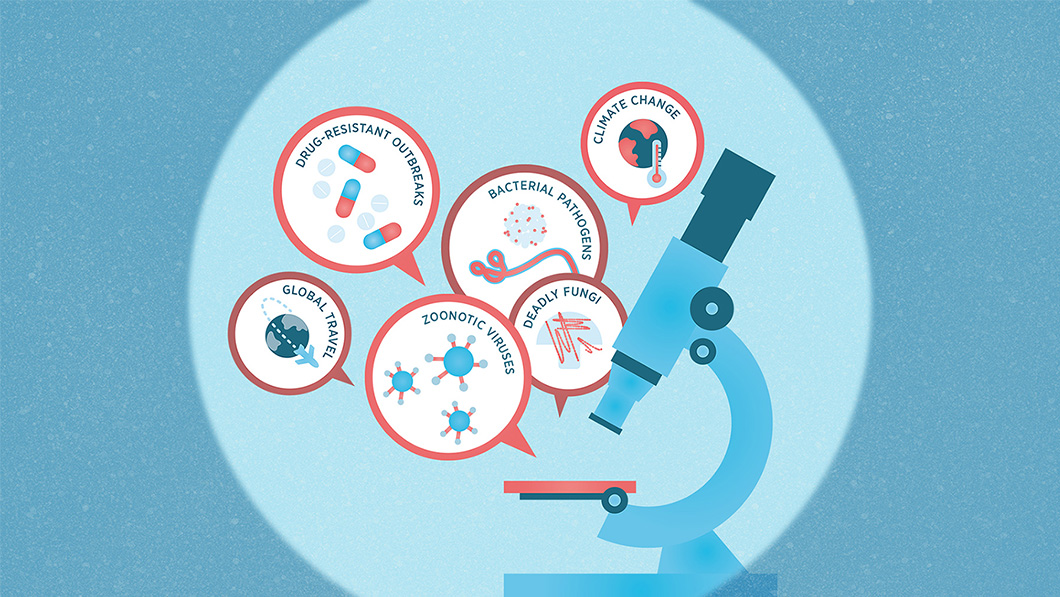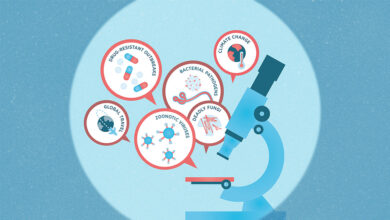
The Strep A mystery and better mosquitoes
Sponsored by:

PPF’s report The Next One: Preparing Canada for another health emergency outlines the lessons learned from the pandemic and how Canada can safeguard against future health emergencies. To keep the discussion going — and to keep Canadians informed — this newsletter looks at what’s happening in the world of health security each week. Here’s what we’re following:
Measles modelling
New modelling from a team at Simon Fraser University paints a potentially grim picture for Canada’s resilience against measles and suggests a major outbreak could be looming.
As of last Friday, there were 31 confirmed measles cases in Canada (the majority of which are in Quebec) – more than double the total number in 2023. The SFU team modelled the potential impact of measles on a community of 1,000 with a 75 percent vaccination rate. (Canada’s rate of children who have had two measles jabs by age 7 in 2021 was only 79.2 percent.) In a community of that size, the modelling suggests an outbreak could grow to at least 100 people with 20 hospitalizations. In a bigger town – of 8,000 – the model suggests more than 1,000 cases.
But not all communities are alike when it comes to vaccination rates. While the national average is low, the average in some areas is abysmal. The SFU team highlighted one, the County of Two Hills in Alberta, where the vaccination rate against measles is just 32 percent, according to 2022 provincial data. And it’s hardly unique. More than 100 communities in Alberta alone fall below the 80 percent vaccination rate. Canada’s national goal is 95 percent.
Security change
Change Healthcare is back online. As of Wednesday, UnitedHealth (the parent company for Change Healthcare) said that all major pharmacy and payment systems were up and claim volume was back to 99 percent of what it was prior to the major February cyberattack that crippled its systems.
The same day, the U.S. Department of Health and Human Services announced that its Office for Civil Rights (OCR) will launch an investigation into whether there was a breach of protected health information, as well as the company’s compliance with the privacy, security and breach notification rules of the U.S.’s Health Insurance Portability and Accountability Act. The health-care sector must adopt a better approach to security practices, Jonathan R. Slotkin and David Vawdrey – both in medical informatics oversight roles at Geisinger Health – wrote this past week at STAT News. They point to the financial sector as a good model to follow, including its “strong regulatory framework, dedicated oversight, formalized stress testing and redundant IT systems.”
They call for a new regulatory entity to oversee critical health-care infrastructure, mandatory stress tests for health-care IT companies, and post-incident investigations by an oversight body.
This week on WONK, Rupa Banerjee explains what’s wrong with Canada’s immigration system
Building a better mosquito?
The relentless spread of dengue fever continues throughout South America, with Brazil the hardest hit. In the first two months of this year, Brazil has seen more than a million cases and 214 deaths. Brazil is now rolling out a vaccine program, but it may not do much in the short term.
For one thing, vaccine uptake is low and distribution is limited — available in only 521 cities, fewer than 10 percent of Brazil’s municipalities. And a vaccine can only do so much while broader sanitation issues persist. Dengue is transmitted via the Aedes aegypti mosquito, which thrives in humid climates.
Dengue has historically been a tropical disease, but that’s changing. A December risk assessment from the UN’s Office for the Coordination of Humanitarian Affairs (OCHA) noted that between 2000 and 2018, dengue cases increased by eight times — from 500,000 to 4.2 million. The risk assessment also noted that not only does climate change expand the potential geographic territory in which the Aedes mosquito can breed, it also makes transmission dynamics more complex.
One longer-term solution might lie in the World Mosquito Program, which has discovered that Wolbachia, a common bacteria found in many insects, blocks diseases like dengue and Zika from growing in the bodies of Aedes mosquitoes. The program breeds mosquitoes with Wolbachia and releases them into the wild, decreasing the risk of diseases such as dengue.
A shrinking CDC
The U.S. Center for Disease Control could shrink dramatically with a Donald Trump win in November, according to POLITICO report. The 2025 Presidential Transition Project outlines a plan, created by the conservative Heritage Foundation think tank, to split the CDC into two parts. One half would be an agency responsible for public health surveillance; the other would be responsible for “limited” public health recommendations.
A change at the CDC is supported by Roger Severino, the former director of Health and Human Services at the Office for Civil Rights during the previous Trump administration. “We have to move away from social engineering and more towards good outcomes,” he told POLITICO, meaning the CDC’s promotion of health equity, COVID-19 masking and vaccination mandates.
The CDC was previously targeted by the Trump White House. In 2021, emails revealed that Trump officials tried to intervene with the CDC’s direction at critical times during the pandemic, including blocking media briefings and interviews with CDC officials, trying to change public safety guidance and instructing CDC officials to destroy evidence that could have been interpreted as political interference.
UPCOMING ON 11 APRIL: Annual Testimonial Dinner Honour Roll 2024
Join more than 1,200 leaders and policy wonks as PPF pays tribute to Canadians who have made outstanding contributions to public policy and good governance. This year’s dinner takes place at the Metro Toronto Convention Centre — in the biggest dining room you’ve ever seen! Be in the room where it happens.
The Strep A mystery
There were 941 cases of a form of group A streptococcal disease, Streptococcal Toxic Shock Syndrome (STSS) recorded in Japan in 2023. Through the first two months of 2024, that number is already at 378, suggesting this year’s total will surpass last year’s already record-breaking figure. As has been the case elsewhere, including in Canada, experts are unclear why the rates of the dangerous disease keep rising — an alarming mystery, given the mortality rate for STSS is between 30 percent and 70 percent.
Some suggest that it’s one of the longer-term side-effects of the COVID-19 pandemic and the corresponding lockdowns and distancing (Japan had one of the lowest fatality rates in the world), as well as depleted immune systems for those who got the disease.
“In my opinion, over 50 percent of Japanese people have been infected by Sars-CoV-2. People’s immunological status after recovering from COVID-19 might alter their susceptibility to some microorganisms,” Ken Kikuchi, a professor of infectious diseases at Tokyo Women’s Medical University, told the Guardian last week.
Tiny killers
Are we under attack from the inside? A study released last week suggests a link between the presence of microplastics in carotid artery plaque and an increased risk of heart attack, stroke or death. More than half of the 257 patients the study followed — all of whom had had fatty plaque removed from their arteries between 2009 and 2020 — were found to have microplastics in follow-up tests.
The researchers said that those who were found to have microplastics and signs of inflammation were 4.5 times more likely to suffer a heart attack, stroke or to die than those in whom the researchers found none. (Heart disease is the top cause of death in Canada after cancer.)
The study adds to a growing field of research into both the presence of microplastics (and nanoplastics, even smaller particles) in our bodies, as well as the threat they post to human health. Earlier research has shown, for instance, that microplastics are found in placentas, suggesting exposure prior to birth. The most recent research adds more important detail to the potential impact of microplastics. Previous research in the Netherlands has found, for example, that immune cells that come into contact with microplastics die three times as quickly than those that do not.
In April, the U.N. will host the fourth session of the Intergovernmental Negotiating Committee on Plastic Pollution in Ottawa to develop an international, legally-binding instrument on the issue. The advanced copy of that document is available here.
Events
March
- March 19-24: Advanced Therapies Summit. London, UK.
- March 19-21: Rare Diseases Summit. Philadelphia, PA.
- March 25-27: Ketamine and Related Compounds International Conference 2024. Oxford, UK.
- March 26-28: Precision Med TRI-CON. San Diego, CA.
April
- April 1-4: World Vaccine Congress. Washington, D.C.
- April 3: Advancing U.S.-Canada Life Sciences Cooperation. Washington, D.C.
- April 15-17: Festival of Biologics. San Diego, CA.
- April 15-17: Bio-IT World Conference & Expo. Boston, MA.
- April 17-18: CMO Summit 360. Boston, MA.
- April 23-29: Intergovernmental Negotiating Committee (4th session). Ottawa, ON.
Did someone forward you this newsletter? Subscribe to PPF: Health Security newsletter
This newsletter is produced by journalists at PPF Media. It maintains complete editorial independence.



